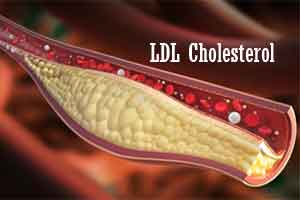- Home
- Editorial
- News
- Practice Guidelines
- Anesthesiology Guidelines
- Cancer Guidelines
- Cardiac Sciences Guidelines
- Critical Care Guidelines
- Dentistry Guidelines
- Dermatology Guidelines
- Diabetes and Endo Guidelines
- Diagnostics Guidelines
- ENT Guidelines
- Featured Practice Guidelines
- Gastroenterology Guidelines
- Geriatrics Guidelines
- Medicine Guidelines
- Nephrology Guidelines
- Neurosciences Guidelines
- Obs and Gynae Guidelines
- Ophthalmology Guidelines
- Orthopaedics Guidelines
- Paediatrics Guidelines
- Psychiatry Guidelines
- Pulmonology Guidelines
- Radiology Guidelines
- Surgery Guidelines
- Urology Guidelines
LDL aggregation - A novel biomarker That predicts mortality risk in Heart Disease

The scientists found that low-density lipoprotein isolated from patients with the known cardiovascular disease was more aggregation-prone than low-density lipoprotein isolated from healthy individuals. The most aggregation-prone LDL was found in those patients who later died from cardiovascular disease.
"This is the first study to show that there are measurable inter-individual differences in the aggregation susceptibility of LDL particles, and that aggregation-prone low-density lipoprotein is predictive of cardiovascular death", summarizes Dr. Öörni.
There is also good news: the study showed that the quality of low-density lipoprotein particles can be improved by cholesterol-lowering medication or by a healthy diet. "Increase in consumption of vegetable oils and a decrease in consumption of sugar decreased LDL aggregation", describes Maija Ruuth, the first author of the research article.
In the future, the new measurement of low-density lipoprotein aggregation may help to improve cardiovascular risk. "This new biomarker may also facilitate identification of patients with currently unrecognized risk for cardiovascular events", suggests Professor Petri Kovanen, a member of the research team.
"Our results identify the susceptibility of low-density lipoprotein to aggregate as a novel measurable and modifiable factor in the progression of human ASCVD," concluded the authors.
For further information follow the link: https://doi.org/10.1093/eurheartj/ehy319

Disclaimer: This site is primarily intended for healthcare professionals. Any content/information on this website does not replace the advice of medical and/or health professionals and should not be construed as medical/diagnostic advice/endorsement or prescription. Use of this site is subject to our terms of use, privacy policy, advertisement policy. © 2020 Minerva Medical Treatment Pvt Ltd